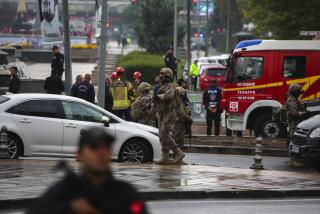10 Iraqis Die in Baghdad Car Bombing
- Share via
BAGHDAD — At least 10 people were killed Tuesday in a suicide car bombing in the capital as resurgent violence and sectarian tensions raised the stakes for lawmakers struggling to finalize a government 11 weeks after landmark elections.
The attack, like many previous ones, targeted a recruiting center for the Iraqi army, whose growing forces are destined to replace U.S. troops, according to the Bush administration blueprint. Iraqi forces have borne the brunt of attacks from insurgents who denounce them as collaborators.
Five Iraqi soldiers and five recruits were killed Tuesday, said Iraqi army Sgt. Ali Khadem, who spoke at the chaotic and bloody scene in the capital’s northwest Adhamiya neighborhood. At least 29 people were injured.
Also Tuesday, insurgents opened fire on Iraqi soldiers in the town of Khaldiya, 75 miles west of Baghdad, killing at least four and wounding seven, news agencies reported. And in the capital, officials said, masked men shot and killed professor Fuad Ibrahim Mohammed Bayati as he left home for the University of Baghdad, the latest in a series of assassinations of academics and professionals apparently aimed at fomenting instability.
The stream of attacks on recruiting centers has prompted authorities to change the times and venues of recruiting sessions. But guerrillas with ample weaponry and operational intelligence have continued to find their targets.
“The strike was very well organized,” Khadem said. “Somehow the insurgents had information that led them to attack today.”
The attack followed a familiar pattern: An explosives-laden vehicle drove up to the gate of the center and was detonated near about 60 men, who were waiting to see the army recruiters inside. At least two passersby were among the injured.
Despite the continued targeting of recruits, aspiring soldiers have continued to show up in droves. Many are poor Shiite Muslims determined to demonstrate support for a new government that is likely to be run by the long-repressed Shiite majority. Rival Sunni Arabs, who lost their long-dominant position with the U.S.-led invasion two years ago, form the backbone of the insurgency.
“I am not joining the army for the money,” said Edward Hussam, 25, a recruit who survived Tuesday’s bombing. “I am doing it to fight terrorism. These infidels are committing crimes against humanity and someone must stop them.”
Across town, Iraq’s transitional National Assembly again failed to name a new government. But outraged lawmakers demanded an apology from U.S. authorities for the alleged mistreatment of a Shiite politician who said he was manhandled and handcuffed at a checkpoint. He is the latest prominent Iraqi to allege abuse at the hands of U.S. personnel.
“American occupation forces say they have come to Iraq for the sake of liberating us, but it seems that is the opposite of what is happening,” the lawmaker, Fatah Sheik, said.
Sheik is head of a small party linked to Muqtada Sadr, an anti-U.S. Shiite cleric.
Other lawmakers vented their rage at U.S. authorities and at least one vowed to work to take back the Green Zone, the heavily fortified compound in central Baghdad where the U.S. Embassy and many Western and Iraqi offices are situated. The presence of a fenced-off zone in the middle of the capital has rankled many Iraqis.
U.S. officials pledged to look into the alleged mistreatment of the lawmaker.
“We regret this incident occurred and are conducting a thorough investigation,” said Brig. Gen. Karl R. Horst in a statement from the U.S. command.
The statement said the lawmaker’s vehicle left a long line of traffic waiting to enter the Green Zone, crossed a median and approached the checkpoint from the opposing traffic lane, a maneuver likely to cause anxiety among guards wary of car bombers.
Upon arriving at the checkpoint, the statement said, the lawmaker exited his car and got into an altercation with an interpreter working with U.S. forces.
“We have the highest respect for all members of the transitional National Assembly,” Horst said.
But the incident, reported prominently in the Arabic- language media, didn’t obscure the fact that the assembly again failed to complete the new transitional government -- almost three months after the national election of Jan. 30.
Many key Cabinet and other posts remain vacant amid bickering about how to split the spoils among parties representing Iraq’s varied religious and ethnic groups.
The assembly has yet to begin its central task: writing a new constitution. The document, once completed, is scheduled to be voted on by Iraqis in mid-October.
As delays mount, however, there are signs that the leadership void may be worsening ethnic and religious tensions. Shiite lawmakers have been using their newfound pulpit to denounce a purported mass kidnapping of Shiites south of Baghdad.
But Sunni Arab representatives have called the reports exaggerated and a pretext to heighten repression.
Times staff writers Caesar Ahmed and Suhail Ahmad contributed to this report.
More to Read
Sign up for Essential California
The most important California stories and recommendations in your inbox every morning.
You may occasionally receive promotional content from the Los Angeles Times.













